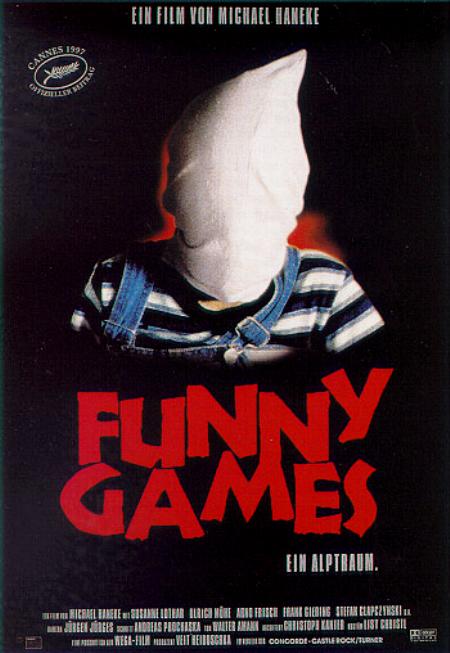Austria; 108min
Crime, Drama, Thriller
Director: Michael Haneke
Writer: Michael Haneke
Stars: Susanne Lothar, Ulrich Mühe, Arno Frisch
Razni filmovi imaju različite ciljeve, Hanekeov Funny Games je po tom pitanju vrlo poseban.
Priča
je jednostavna, bogata obitelj, otac Georg, majka Anna te sin Georg
(mlađi), dolazi u svoju poveću vikendicu na odmor. Haneke njihov
socijalni sloj izrazito ističe od samog početka, preko skupocijenog
automobila, ogromne vikendice, klasične galzbe, broda, golfa, njihovih
prijatelja pa do silne, u to doba napredne, tehnologije. To je jedan od
načina na koji pokušava gledateljima dati razlog da opravdaju ono što se
toj obitelji tijekom filma događa. Nakon što se gledatelji donekle
upoznaju sa idiličnom obitelji u priču ulaze Paul i Peter. Psihotični
mladići obučeni potpuno u bijelo sa bijelim rukavicama koje odmah na
početku filma primjetimo u susjednoj kući u čudnom razgovoru sa
tamošnjim ukučanima. Interkacija s obitelji počinje nevinim traženjem
jaja od Anne koje se pretvori u iritantnu farsu na koju koje Anna i
Georg odluče izbaciti dvojac iz kuće, no taj pokušaj završi Georgeovom
slomljenom nogom te polako mučenje počinje.
Nastavak
se svodi na 'igre' psihotičnog dvojca sa obitelji poput skrivača sa
tijelom mrtvog psa, a vrhunac je oklada s obitelji da nitko od njih neće
preživjeti sljedećih 12 sati.
Sad
se vraćamo na posebnost cilja ovog filma. Hanekeov glavni cilj je
zagađivanje nasilja filmskim gledateljima na način da to isto besmisleno
nasilje u kojem uživaju na filmu dovede jednoj obitelji te mu je želja
da gledatelj ne pogleda film do kraja. Ciljni trenutak je scena nakon
prve smrti u filmu koja traje nekoliko minuta i u kojoj se apsolutno
ništa ne dogodi, samo je prikazan užas nasilja i njegove posljedice.
Film
također služi kao svojevrsni pokus u kojem Haneke na razne načine
pokušava dati suluda opravdanja za teror koji obitelj prolazi, te se čak
u pojedinim trenutcima jedan od mladića zagledava u kameru, namiguje te
se tužno obraća gledatelju sa konstatacijom kako je on sigurno na
strani žrtava.
Taj
scenaristički dio će se rijetko kome svidjeti, što u konačnici i je
poanta. Tehnički dio je s druge strane kvalitetno odrađen. Gluma je
također na visokom nivou, posebno od dvojca Giering-Frisch koji
utjelovljuje Petera i Paula. Zamjerka ide na neiskorištavanje velikog
kapaciteta Ulricha Mühea koji u ulozi oca većinu filma proleži na podu.
Poseban film sa tematikom samog filma tj. nasilja u filmu, koji uglavnom, barem kratkoročno ispunjava svoju svrhu.





Nema komentara:
Objavi komentar